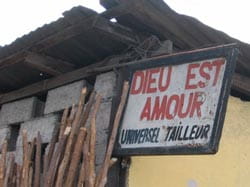The Evangelical Portal at Patheos is beginning a new series called "In the Trenches" to tell the stories of Christians here and abroad who are working to serve and to witness in places of great suffering, turmoil, and need. In light of the devastating earthquake in Haiti, we thought we should highlight the work of Christian ministers there.
After graduating from university, Kent Annan served refugees from the former Yugoslavia, Iran, and Sierra Leone for two years. Then he went to Princeton Theological Seminary for his Master of Divinity degree, and after he graduated he moved to Albania and then Kosovo to continue working with refugees. After a brief stay back in the United States, during which he got married, Annan went to Haiti for two and a half years with Tony Campolo's Beyond Borders ministry.
Annan is now co-director of Haiti Partners, a non-profit devoted to serving and strengthening Haitians through education. His book, Following Jesus Through the Eye of the Needle(InterVarsity Press), recounts his move to Haiti and the joys and trials of ministering in the deep trenches of the world.
He spoke with Timothy Dalrymple by phone.
 Can you tell us about the history and vision of Haiti Partners?
Can you tell us about the history and vision of Haiti Partners?
I've been working in Haiti for almost exactly seven years now. When I first joined, it was called Beyond Borders, which came out of Tony Campolo's ministry. A year ago, another of the Beyond Bordersworkers and I were spun off to a sister organization that is now called Haiti Partners. So it's a new organization, but I've been working in Haiti for seven years, and my co-director has been working in Haiti for twenty years, doing the same work.
Our focus is to help Haitians change Haiti through education. There's a real vision for justice and addressing all the struggles Haiti has endured, but our focus is not on doing things for Haiti, so to speak, but on building into Haitians through education.
We had four schools. Three collapsed in the earthquake. We have teacher training, training about 300 teachers per year. We have an intensive leadership program, with forty community leaders from throughout the country. Then we have a disciples program, that this year will see 10,000 people receive Bibles as well as training in Bible study materials, in order to help their churches through better education.
How has your ministry there changed since the earthquake?
Everybody who was there doing ministry suddenly became a relief organization to the best that they could. So for the past five weeks we have been trying to get money to people, so that they can get the basics of food, water, shelter, and health supplies. We've taken a medical team down to Haiti. We're discerning the ways in which we can help our people and the communities we are involved with immediately.
That's transitioned in the past week or so. Recently we launched children's activities at three of our four schools. So, beside the schools, they are under tarps doing coloring and singing and other activities that are really positive for them. This is a key transition after a disaster -- getting children not straight back into school, but back into a routine of positive activities.
And next week we'll be breaking ground on at least two new learning centers. This will create construction jobs, as the Haitians themselves will make a building they can use as a school and also as a shelter in the rainy season. It will take eight weeks to build and will create over 100 jobs, and then eventually it will provide a place for school activities as well as for people to sleep who are homeless right now.
You said that three of the four school buildings collapsed. Was anyone in the buildings when they collapsed?
No, fortunately, since it was afternoon, almost five o'clock, nobody was in any of the schools. We're really grateful for that.
Stories about Haiti have begun to fade from our television screens. The number of the dead is staggering. There was great need at the beginning to meet basic needs. Do you feel as though you have gotten through the worst? Are the most immediate needs satisfied by now?
There are all kinds of concerns still about food, water, shelter. With hundreds of thousands of people homeless, sleeping out under sheets or tarps, public health officials are worried about infectious diseases. There are definitely all kinds of urgent needs, and it seems like few organizations have the capacity of something like Red Cross or World Vision, with immense resources (which is fantastic) that they can pour into the immediate needs.




